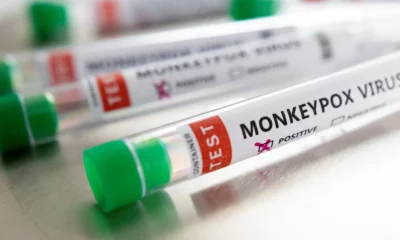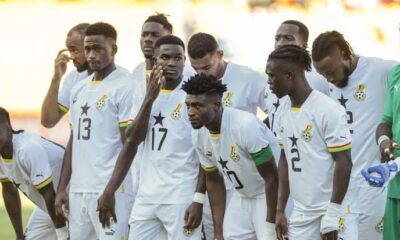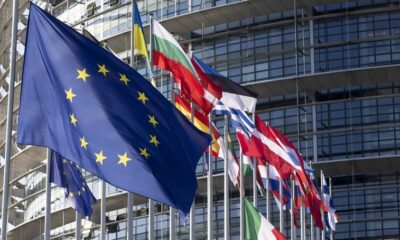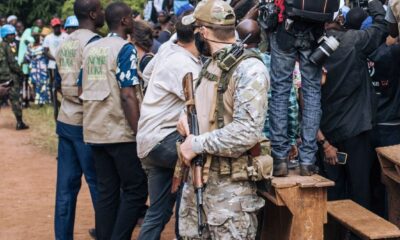Nearly all African ambitions depend on thriving agriculture to support modern economies across the continent.
Strictly Personal
Why Morocco’s OCP and Africa Need Each Other, By Jasper Hamann
Published
10 months agoon

Rabat – Countries across the African continent currently stand at a crossroads, facing choices that could determine their fate for decades or even centuries to come. While developed countries around the world are currently focusing on Artificial Intelligence (AI) as the driver for economic growth in the coming years, African countries are still struggling with issues that keep their economies stuck in the 20th century. Left behind?
Decision-makers at last week’s World Economic Forum summit in Davos salivated over the potential of AI as a means to boost their primarily service-oriented economies. Meanwhile, most African countries are still struggling to fully industrialize. African economies are making a sincere effort to reach a stage of development, that of an industrial manufacturing economy, which is a type of economy that the richest countries in the world have abandoned decades ago…
This disturbing trend can be attributed to a multitude of factors, and there are various interesting articles that point to corruption, poor leadership, the lingering effects of colonialism, as well as ongoing conflict and poverty as the prime or even sole reason for Africa’s continued lagging behind in the global economic race. While these articles often provide well-reasoned arguments to point to one factor or the other, in reality it appears to be exactly the complexity of these intertwining issues that has kept African nations where they currently are.
So how can such a complex web of issues be resolved, on a continent that has witnessed an onslaught of coup-d’etats, famine, drought, violent extremism and poverty? I would argue that the key is to start with the absolute fundamentals, the core drivers of stability and sustainable growth. This is the first stage that developed nations have taken, and it is a stage only a handful of African countries have (partially) reached.
I am talking about a country’s ability to produce enough food to feed its population, and the resulting freeing up of labor to support other sectors of the economy. Most European countries reached this stage during the “agricultural revolution,” between the 17th and 19th century, which freed up large parts of the population to instead work in trade, industry, the arts, or academia.
Often referred to in the rather abstract term of “food security,” this phase is crucial in a nation’s development because it creates the foundation for a stable economy where the nation’s talents can flourish.
African ambitions
Still, African nations are definitely not lacking vision when it comes to their economic development. There’s Senegal’s “Emerging Senegal” plan, Ethiopia’s “Growth and Transformation plans,” or Morocco’s own “New Development Model,” which embarrassingly still features a typo in the title of its official English government publication.
If you crave more vision, just have a look at Kenya’s “Vision 2030,” or Egypt’s “Egypt Vision 2030,” or perhaps you can find inspiration in Tanzania’s “Vision 2025.” If that is not enough vision for your liking, there is always Rwanda’s “Vision 2050,” or Cameroon’s “Vision 2035.”
What these documents lack in terms of originality in their naming, they all share in ambitious targets and dreams of becoming a thriving modern economy.
Yet nearly all of these documents also recognize a significant issue plaguing this development. Africa’s top resource, its vibrant young and talented population, is stuck tilling the soil to produce meager yields at their family farms. While farming is arguably one of the world’s most noble professions, ideally as a modern country you would like to have as few people as possible doing it, while producing rich yields that support both domestic consumption and exports.
Having a thriving domestic agricultural sector is a key factor in reaching nearly all of the buzzwords that regularly roll off politicians’ tongues. It is vital to sustainable development, clean energy, technology-driven economies and being a genuinely competitive international player in the coming AI era that is likely to change our labor markets and economies like never before.
Africa’s handicap
One factor that is often left unspoken in these visionary documents, is what can be considered to be Africa’s handicap, the thing that leaves it trailing its Northern and Western neighbors, as well as other developing countries in the East. This handicap is as clear as it is ever-present; African countries face more extreme weather conditions and harsher climates, and climate change is only going to make this worse in decades to come.
Still, harsh climates and extreme weather are issues that modern agriculture has its answers to, mostly in the form of modern farming techniques, water preservation, and fertilizers.
A good example is Australia, which receives the least rainfall of any inhabited continent on the planet. Despite this, and the ever-growing effects of climate change, Australia has spent the last three decades boosting its agricultural productivity and output, through modern farming techniques, technology and fertilizers.
The irony is that much of the minerals feeding Australian soil and boosting local farmers’ yields, comes from Africa. In fact, 83% of Moroccan exports to Australia are classified as “mixed mineral or chemical fertilizers,” followed by its next biggest export of “non-knit women’s suits,” at 1.87%.
These fertilizers are primarily made from Morocco’s vast phosphate reserves. This resource is so vital that when Norway in June 2023 discovered its own large reserves, the EU went out of its way to release a statement hailing it as “great news” for the continent. And phosphate is not just used for vital fertilizers; it is also a key component in various types of electric cars, batteries and solar panels, all important products for Africa’s envisioned economic boom.
Yet for farmers in many African countries, fertilizers have long been the missing ingredient to take the step toward self-sufficiency that could become the foundation of true sustainable economic growth.
Quality fertilizers are often too expensive for African farmers, reducing agriculture from being an “engine of growth” to becoming a brake on national economic development.
This has dire effects far beyond agriculture, as low yields and inefficient agriculture does not just hurt farmers and consumers, but also limits the amount of people available to work in every other sector of the economy.
It is important to recognize the wonderful irony that boosting agriculture means fewer people have to work in agriculture. This means that smallholder farmers can send their children to universities, and young Africans can focus their talent on building technology, providing healthcare or services or starting businesses.
Perfect match
Moroccan fertilizers have long fed agriculture from the US to Australia, yet remain inaccessible to many farmers in Africa. This problematic fact is not just a concern to those farmers, but also to Morocco’s largest fertilizer producer: the OCP Group.
Over the past decades the state-owned phosphate company has evolved from a modest mining company to a fertilizer giant that outcompetes most of its international competitors from some of the world’s richest countries.
As OCP Group evolved into a global player in its sector, its vision has also evolved, primarily around its focus on Africa, Morocco’s home continent. Over the past years, Morocco and OCP Group have made fertilizers a key part of diplomacy, trade, and south-south cooperation.
This focus has not just been beautiful words on the company’s “vision and mission” page, but instead has led to a variety of bilateral agreements with other African states. It has resulted in fertilizer plants being erected in Ethiopia, Nigeria and Ghana, with Togo and Senegal as two likely next candidates for such production facilities. It hasn’t just led to a wider availability of quality fertilizers, but also to a richer offering of products tailored to the context of African countries.
To support this, OCP Group and Morocco’s Mohammed VI Polytechnic University (UM6P) are building state-of-the-art digital soil maps in a variety of African countries, including Ethiopia,Senegal, Zambia, Kenya and others. These maps allow scientists to tailor fertilizers to the exact soil types of the receiving countries, which helps boost yields, while limiting the need to overuse fertilizers, which helps perverse the fertility of the soil and limits the cost of fertilizing land.
Fertilizers have even become a tool for emergency aid, which became apparent in 2022, when Morocco gifted 1,200 metric tons of fertilizer to Jamaica amid the island nation’s disastrous local supply crisis.
Mutually beneficial
It is important to recognize that this larger strategy is not a form of charity, and OCP Group is not trying to act like a benevolent patron. Morocco and its OCP Group need Africa as much as the reverse.
Africa currently is home to 60% of the world’s uncultivated arable land, the world’s youngest population, the richest reserves of natural resources, and the most room to develop.
By boosting African nations, OCP Group and Morocco build their own list of clients, closer to home, which means transport can be done more sustainably. It means being a key partner in feeding billions of people with locally-sourced food. It means building positive relations with fellow African countries, and it means being part of the broader economic success of the continental economy, when current treaties like the African Continental Free-Trade Area (AfCFTA) can blossom and become a driving force in a complementary pan-african economic boom.
But the benefits of genuine cooperation on fertilizers and agri-tech go well beyond economics. The results of such cooperation can ensure nations thrive and avoid coups, which in turn can help feed and develop restless remote areas where violent extremism could otherwise rise. In short, societal prosperity brings stability, promotes good governance, and a strong civil society — all crucial needs across the continent.
For Morocco and the wider region, this means using local resources to produce African development, without the need for foreign capital or foreign multinationals to “help” extract a nation’s resources.
Furthermore, when we connect Morocco’s phosphate wealth with Nigeria’s gas reserves, or DR Congo’s vast areas of uncultivated fertile land, the compounding effects of this Africa-oriented approach could help elevate a continent full of young motivated people.
Of all the ambitious national plans and government documents with the word “vision” on their cover, the symbiotic relationship between Morocco’s OCP and the broader African continent represents a potential blueprint for sustainable development. It shows that action speaks louder than words and that trade is not a zero-sum game where one party’s wealth has to come at another’s expense.
This narrative is more than just about fertilizers or agriculture; it’s about rewriting Africa’s story from one of dependence on the outside to one of African interdependence and strength. In this vision, Africa’s potential is fully realized, not just for the continent but as a vital contributor to the global community. The story of Morocco and Africa, therefore, is one of hope, resilience, and the unyielding belief that together, they can rise to meet the challenges of the 21st century and beyond.
But to meet these ambitions, we need a focus on the core issue that handicaps African development. While boosting agriculture might not sound as “sexy” to political leaders as topics such as high-tech manufacturing or AI, recognizing the need to prioritize it paves the way for the continent’s nations to build a new modern economy on a solid foundation.
You may like
-


TP Mazembe pip AS FAR to win African Women’s Champions League
-


Zambia: Farmers’ union warns of uncertain future for agriculture sector
-


Wafcon 2024 draw throws up interesting pairings
-


Nigeria ranks 7th with international students’ enrolment in US
-


Morocco’s Mpox test gets African CDC endorsement
-


Ghanaians in tears as Black Stars fail to make AFCON 2025y
Strictly Personal
Budgets, budgeting and budget financing, By Sheriffdeen A. Tella, Ph.D.
Published
4 days agoon
November 20, 2024
The budget season is here again. It is an institutional and desirable annual ritual. Revenue collection and spending at the federal, State and local government levels must be authorised and guided by law. That is what budget is all about. A document containing the estimates of projected revenues from identified sources and the proposed expenditure for different sectors in the appropriate level of government. The last two weeks have seen the delivery of budget drafts to various Houses of Assembly and the promise that the federal government would present its draft budget to the National Assembly.
Do people still look forward to the budget presentation and the contents therein? I am not sure. Citizens have realised that these days, governments often spend money without reference to the approved budget. A governor can just wake up and direct that a police station be built in a location. With no allocation in the budget, the station will be completed in three months. The President can direct from his bathroom that 72 trailers of maize be distributed to the 36 states as palliatives. No budget provision, and no discussion by relevant committee or group.
We still operate with the military mentality. We operated too long under the military and of the five Presidents we have in this democracy, two of them were retired military Heads of State. Between them, they spent 16 years of 25 years of democratic governance. Hopefully, we are done with them physically but not mentally. Most present governors grew up largely under military regimes with the command system. That is why some see themselves as emperor and act accordingly. Their direct staff and commissioners are “Yes” men and women. There is need for disorientation.
The importance of budget in the art of governance cannot be overemphasized. It is one of the major functions of the legislature because without the consideration and authorisation of spending of funds by this arm of government, the executive has no power to start spending money. There is what we refer to as a budget cycle or stages. The budget drafting stage within the purview of the executive arm is the first stage and, followed by the authorisation stage where the legislature discusses, evaluates and tinkers with the draft for approval before presenting it to the President for his signature.
Thereafter, the budget enters the execution phase or cycle where programmes and projects are executed by the executive arm with the legislature carrying out oversight functions. Finally, we enter the auditing phase when the federal and State Auditors verify and report on the execution of the budgets. The report would normally be submitted to the Legislature. Many Auditor Generals have fallen victim at this stage for daring to query the executives on some aspects of the execution in their reports.
A new budget should contain the objectives and achievements of the preceding budget in the introduction as the foundation for the budget. More appropriately, a current budget derives its strength from a medium-term framework which also derives its strength from a national Development Plan or a State Plan. An approved National Plan does not exist currently, although the Plan launched by the Muhammadu Buhari administration is in the cooler. President Tinubu, who is acclaimed to be the architect of the Lagos State long-term Plan seems curiously, disillusioned with a national Plan.
Some States like Oyo and Kaduna, have long-term Plans that serve as the source of their annual budgets. Economists and policymakers see development plans as instruments of salvation for developing countries. Mike Obadan, the former Director General of the moribund Nigeria Centre for Economic and Management Administration, opined that a Plan in a developing country serves as an instrument to eradicate poverty, achieve high rates of economic growth and promote economic and social development.
The Nigerian development plans were on course until the adoption of the World Bank/IMF-inspired Structural Adjustment Programme in 1986 when the country and others that adopted the programme were forced to abandon such plan for short-term stabilisation policies in the name of a rolling plan. We have been rolling in the mud since that time. One is not surprised that the Tinubu administration is not looking at the Buhari Development Plan since the government is World Bank/IMF compliant. It was in the news last week that our President is an American asset and by extension, Nigeria’s policies must be defined by America which controls the Bretton Woods institutions.
A national Plan allows the citizens to monitor quantitatively, the projects and programmes being executed or to be executed by the government through the budgeting procedure. It is part of the definitive measures of transparency and accountability which most Nigerian governments do not cherish. So, you cannot pin your government down to anything.
Budgets these days hardly contain budget performance in terms of revenue, expenditure and other achievements like several schools, hospitals, small-scale enterprises, etc, that the government got involved in successfully and partially. These are the foundation for a new budget like items brought forward in accounting documents. The new budget should state the new reforms or transformations that would be taking place. Reforms like shifting from dominance of recurrent expenditure to capital expenditure; moving from the provision of basic needs programmes to industrialisation, and from reliance on foreign loans to dependence on domestic fund mobilisation for executing the budget.
That brings us to the issue of budget deficit and borrowing. When an economy is in recession, expansionary fiscal policy is recommended. That is, the government will need to spend more than it receives to pump prime the economy. If this is taken, Nigeria has always had a deficit budget, implying that we are always in economic recession. The fact is that even when we had a surplus in our balance of payment that made it possible to pay off our debts, we still had a deficit budget. We are so used to borrowing at the national level that stopping it will look like the collapse of the Nigerian state. The States have also followed the trend. Ordinarily, since States are largely dependent on the federal government for funds, they should promote balanced budget.
The States are like a schoolboy who depends on his parents for school fees and feeding allowance but goes about borrowing from classmates. Definitely, it is the parents that will surely pay the debt. The debt forgiveness mentality plays a major role in the process. Having enjoyed debt forgiveness in the past, the federal government is always in the credit market and does not caution the State governments in participating in the market. Our Presidents don’t feel ashamed when they are begging for debt forgiveness in international forum where issues on global development are being discussed. Not less than twice I have watched the countenance of some Presidents, even from Africa, while they looked at our president with disdain when issues of debt forgiveness for African countries was raised.
In most cases, the government, both at the federal and state cannot show the product of loans, except those lent by institutions like the World Bank or African Development Bank for specific projects which are monitored by the lending institutions. In other cases, the loans are stolen and transferred abroad while we are paying the loans. In some other cases, the loans are diverted to projects other than what the proposal stated. There was a case of loans obtained based on establishing an international car park in the border of the State but diverted to finance the election of a politician in the State. The politician eventually lost the election but the citizens of the State have to be taxed to pay the loan. Somebody as “Nigeria we hail thee”.
Transformation in budgeting should commence subsequently at the State and federal level. Now that local government will enjoy some financial autonomy and therefore budgeting process, they should be legally barred from contracting foreign loans. They have no business participating in the market. They should promote balanced budget where proposed expenditures must equal the expected revenues from federal and internal sources. The State government that cannot mobilise, from records, up to 40 percent of its total budget from IGR should not be supported to contract foreign loans. The States should engage in a balanced budget. The federal government budget should shift away from huge allocations to recurrent expenditure towards capital expenditure for capital formation and within the context of a welfarist state.
Sheriffdeen A. Tella, Ph.D.
Strictly Personal
African Union must ensure Sudan civilians are protected, By Joyce Banda
Published
1 month agoon
October 25, 2024
The war in Sudan presents the world – and Africa – with a test. This far, we have scored miserably. The international community has failed the people of Sudan. Collectively, we have chosen to systematically ignore and sacrifice the Sudanese people’s suffering in preference of our interests.
For 18 months, the Rapid Support Forces (RSF) and the Sudanese Armed Forces (SAF) have fought a pitiless conflict that has killed thousands, displaced millions, and triggered the world’s largest hunger crisis.
Crimes against humanity and war crimes have been committed by both parties to the conflict. Sexual and gender-based violence are at epidemic levels. The RSF has perpetrated a wave of ethnically motivated violence in Darfur. Starvation has been used as a weapon of war: The SAF has carried out airstrikes that deliberately target civilians and civilian infrastructure.
The plight of children is of deep concern to me. They have been killed, maimed, and forced to serve as soldiers. More than 14 million have been displaced, the world’s largest displacement of children. Millions more haven’t gone to school since the fighting broke out. Girls are at the highest risk of child marriage and gender-based violence. We are looking at a child protection crisis of frightful proportions.
In many of my international engagements, the women of Sudan have raised their concerns about the world’s non-commitment to bring about peace in Sudan.
I write with a simple message. We cannot delay any longer. The suffering cannot be allowed to continue or to become a secondary concern to the frustrating search for a political solution between the belligerents. The international community must come together and adopt urgent measures to protect Sudanese civilians.
Last month, the UN’s Independent International Fact-Finding Mission for Sudan released a report that described a horrific range of crimes committed by the RSF and SAF. The report makes for chilling reading. The UN investigators concluded that the gravity of its findings required a concerted plan to safeguard the lives of Sudanese people in the line of fire.
“Given the failure of the warring parties to spare civilians, an independent and impartial force with a mandate to safeguard civilians must be deployed without delay,” said Mohamed Chande Othman, chair of the Fact-Finding Mission and former Chief Justice of Tanzania.
We must respond to this call with urgency.
A special responsibility resides with the African Union, in particular the AU Commission, which received a request on June 21 from the AU Peace and Security Council (PSC) “to investigate and make recommendations to the PSC on practical measures to be undertaken for the protection of civilians.”
So far, we have heard nothing.
The time is now for the AU to act boldly and swiftly, even in the absence of a ceasefire, to advance robust civilian protection measures.
A physical protective presence, even one with a limited mandate, must be proposed, in line with the recommendation of the UN Fact-Finding Mission. The AU should press the parties to the conflict, particularly the Sudanese government, to invite the protective mission to enter Sudan to do its work free from interference.
The AU can recommend that the protection mission adopt targeted strategies operations, demarcated safe zones, and humanitarian corridors – to protect civilians and ensure safe, unhindered, and adequate access to humanitarian aid.
The protection mission mandate can include data gathering, monitoring, and early warning systems. It can play a role in ending the telecom blackout that has been a troubling feature of the war. The mission can support community-led efforts for self-protection, working closely with Sudan’s inspiring mutual-aid network of Emergency Response Rooms. It can engage and support localised peace efforts, contributing to community-level ceasefire and peacebuilding work.
I do not pretend that establishing a protection mission in Sudan will be easy. But the scale of Sudan’s crisis, the intransigence of the warring parties, and the clear and consistent demands from Sudanese civilians and civil society demand that we take action.
Many will be dismissive. It is true that numerous bureaucratic, institutional, and political obstacles stand in our way. But we must not be deterred.
Will we stand by as Sudan suffers mass atrocities, disease, famine, rape, mass displacement, and societal disintegration? Will we watch as the crisis in Africa’s third largest country spills outside of its borders and sets back the entire region?
Africa and the world have been given a test. I pray that we pass it.
Dr Joyce Banda is a former president of the Republic of Malawi.
EDITOR’S PICK


EU withdraws Niger diplomat after junta accuses it of mismanaging aid
The European External Action Service (EEAS) has announced that the European Union would return its ambassador from Niger after the...


Mali: 7 Russian mercenaries killed
An al Qaeda offshoot in North Africa has claimed responsibility for the attack in central Mali, killing at least seven...


Mpox remains health emergency, WHO insists
The World Health Organisation (WHO) has insisted that the Mpox epidemic remains a public health emergency. WHO first declared an...


Italy concerned over adult actor detained in Egypt
Officials in Italy, where sentiments are still high over the unresolved murder of student Giulio Regeni, who was detained and...


Fintech startup DigMo launched in Zambia to gamify financial planning
DigMo, a gamified fintech startup which helps users to build wealth tools from low to middle-income earners, has been launched...


TP Mazembe pip AS FAR to win African Women’s Champions League
TP Mazembe of the Democratic Republic of Congo (DRC) became the third team to win the 2024 African Women’s Champions...


Nicki Minaj eulogizes Davido for collaborating with her on new song
American rapper, Onika Maraj, popularly known as Nicki Minaj, has poured encomium on Nigerian Afrobeats superstar, David Adeleke, aka Davido,...


Zambia: Farmers’ union warns of uncertain future for agriculture sector
The Small-Scale Farmers Development Agency (SAFADA) of Zambia has warned of uncertainty on the future of the agricultural sector, stating...


Nigeria: CSO urges President Tinubu to investigate missing funds in Humanitarian Ministry
A Nigerian civil society organization, the Socio-Economic Rights and Accountability Project (SERAP), has called on President Bola Tinubu to launch...


South African DJ Black Coffee bags World’s Best DJ 2024
South African disc jockey, DJ Black Coffee, has been named the World’s Best DJ 2024 at the Golden Moon Awards....
Trending
-

 Politics2 days ago
Politics2 days agoMauritius’ Prime Minister to double as Finance Minister
-

 Metro2 days ago
Metro2 days agoFinland-based Nigerians in panic as authorities search for Simon Ekpa’s sponsors
-

 Metro12 hours ago
Metro12 hours agoNigeria: CSO urges President Tinubu to investigate missing funds in Humanitarian Ministry
-

 Metro1 day ago
Metro1 day agoZambian govt successfully repatriates trafficked toddler from Mozambique


